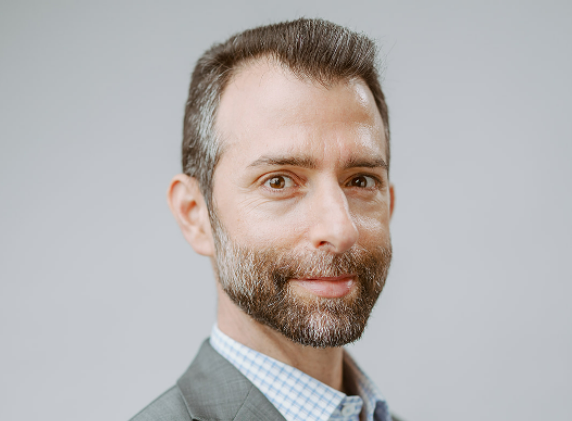
I had the opportunity to sit down with Dan Koppel, MSFS, CFP®, as he told me about his unique journey from studying music to becoming a seasoned financial planner, motivated by personal experiences such as assisting his mother after her divorce.
Tell us about yourself.
I graduated from Middlebury College in Vermont with a music degree. I had an interest in music all through high school, and it was an opportunity to study something intensively that I would likely not be able to dig into very much later in life.
I'm a fitness fanatic. I'm a big runner. I love to ski. Downhill skiing is probably my favorite thing in the world. I've also been a yoga practitioner for 20 years now. And my kids started learning karate five years ago. Two years ago, I decided to learn too, so we train together, studying an older style called Uechi-Ryū. The adults who train are from all walks of life. I love environments where people from different backgrounds come together. I grew up in New York City, where you can see people from all walks of life in one place.
What's a hobby of yours that influences your work in a positive way?
Running is something I've done on and off and since 2009. Achieving running success is very similar to executing a successful financial plan. Running is a sport that rewards small amounts of disciplined action over time. You need to train consistently for months and years to become a better runner. I ran a marathon two years ago, and it took many months just to be able to run that far, and more months after that to begin to do it reasonably well. In financial planning, the financial plan's success also requires ongoing discipline over a long time period. If you stick to the plan over months and years, you will achieve amazing results.
I've known people who have gone from barely being able to run a mile to running a marathon, and it's astounding how that happens. The first time you run a mile, it can seem completely impossible. How can you ever run 26 miles? This is just like someone beginning to save in their 401(k) and saying, "My balance is $100. How is this ever going to be a hundred thousand dollars or a million dollars?" But we've seen it happen. We've heard people whom we've worked with for many years say, "I can't believe how much money I have now." All from consistent behavior over time.
How did you get your start in financial planning?
After college, I got into financial planning primarily out of self-interest and then to assist my mother, who had gone through a divorce. My wife and I had moved to Boston so she could attend graduate school, and I decided to look at financial planning as a career. I started taking CFP® courses at Boston University in 2006. My first job in this field was in 2007 with an RIA [registered investment advisor] in Cambridge. It was just one lead advisor and me, and I did virtually everything except craft the specific recommendations for our clients. I put together financial plans, ran account reports, analyzed investments, opened accounts and moved money, and I participated in meetings. It was a great introduction in that I got exposure to every part of the business during those couple of years.
The first few years of my career were dominated by the financial crisis, one of the most difficult investment climates in modern times. The advisor I worked with had decades of experience, and it was a remarkable education to see how she handled this and spoke to her clients and how we managed accounts during that time. It absolutely has impacted my thinking about planning work ever since.
What do you enjoy most about working at Milestone?
I really enjoy working with the clients we have. Milestone seems to attract people who are engaging and have interesting backgrounds. I also appreciate that it's an extremely well-organized business. There are very high standards for the service we provide to our clients, how we treat employees and how we operate as an organization.
Many planning firms have very high standards for how they treat their clients and employees, but Milestone is different. Most financial planning and investment advisory businesses are small businesses, with one to a dozen employees. Many of those firms are built around one advisor/owner and the rest of the team is there to support that individual. Milestone is built around a group of owners and advisors and a mindset of long-term growth and continuity as an organization. For many small investment advisors, the end goal of the owner is to be bought out by a large, multibillion-dollar firm so they cash out of their business. The goal here, however, is to enable younger advisors to grow and take over from the existing owners over time, creating continuity for our employees and our clients. Milestone will always remain independent. That's core to how we run the business, how people are treated and whom we decide to hire.
What motivates you the most about your job?
I love having a positive impact on people's lives. For example, during the COVID-19 pandemic I worked with many individuals who lost family members and were dealing with administering estates. That can be very complicated and stressful. I was able to alleviate clients' anxiety because we had a plan for that. We then worked with them to execute that plan. It didn't replace their loss, but it made their lives easier at that time. That was very rewarding.
There are other things I find rewarding. In my last position prior to Milestone, I was involved in the management of the practice for six years. I really enjoyed the experience of learning how to effectively lead and grow a team — how to develop a plan for a business and then execute and update it as we faced challenges along the way. After spending 10 years very focused on developing financial plans, it was refreshing to take on a new area where I could learn and develop. We took this organization from a four-person team to a 12-person team while I was there.
What is your greatest strength?
My greatest strength is also my greatest weakness.
I'm extremely detail-oriented. This means I notice things when I review documents, such as estate plans, annuity contracts and other documents that many people find overwhelming. I am extremely good with financial planning calculations. However, I have learned not to include all that detail in my communication with others. I'll always offer to go into more detail so there's recognition that there's a lot of work behind our advice, but many people prefer to just hear the advice.
I'm also very authentic in how I communicate. I think that allows me to build trust with individuals because if I don't know something, I'll tell them. If I do something very well, I'll tell them. Who they see when they're talking to me — what they hear, how I'm relating to them — is who I am.
What sets your approach to financial advising apart from others in the field?
This is tied to my attention to detail. I do a lot of work to customize planning recommendations to each individual client. I take all of what I know and bring it to bear on someone's specific circumstances, and I will always adapt my thinking and recommendations to what is best for them in their specific situation.
I'm also extremely thorough. In our work with clients, we sometimes have opportunities to drastically improve the situation with the implementation of one straightforward action. Estate planning is a good example. There are relatively simple things we can do immediately by signing one document to save a client's family a significant amount of money and/or time.
In addition to getting the basics right, it's a succession of smaller things that we do that add value. The investments we select and the way we rebalance accounts over time, for example. The Roth contributions or conversions that we make for clients may seem small, but they grow exponentially over 10 to 20 years, providing a tax-free asset to use in retirement or to pass on to heirs. Another example is engaging in tax planning to shift income from one year to another in order to keep someone in a lower tax bracket. It's the small things that we do over the course of months, years and decades that add up over time.
That takes diligence and willpower to keep your eyes open and pay attention every day, every week, every month, every year.
What is a common fear that clients have?
Where do I start? Running out of money is a very common fear, regardless of how much money somebody has.
I work with people who have, in my mind, an infinitesimal chance that they will run out of money based on the resources they have and the amount they spend. But they have this fear, and that's a hard one. I've learned that I can't turn someone around on that in one or two meetings. I need to be very patient in working with that fear and communicating why they're going to be okay, why they have plenty of resources and why the plan we're putting together will work for them.
I try to bring the focus into a little more of the here and now. What do you really need in retirement? You need a monthly income and a withdrawal strategy to support your lifestyle. This then ties to the investment discussions, to say that "and of this big bucket of your investments, we're holding this much outside of stocks," because everyone is afraid that stocks will decline in value. Then we equate that to how much is withdrawn from their portfolio each month and show that we typically have five years' worth of "income" without withdrawing from the stock portion of their portfolio.
This is important because historically, when stocks decline, they have usually recovered within five years, and usually sooner. We usually have five years' worth of distributions in safe investments.
What I'm trying to do is recognize the client's fears and then communicate how we're addressing those in our planning. Because fear is an emotion, and emotions are not right or wrong. What I try to do is say, "Yes, I understand your fear, and this is how we're addressing it in your plan."
What advice would you give to someone seeking financial advice for the first time?
Think about what your goals are.
A misperception in the industry is that everything we do is associated with dollars and cents. Everyone's goals are different, so their financial plan will have different possible solutions and outcomes. The clearer you are about your needs and your goals and why you're coming to an advisor, the better they're able to help you. Money is only one part of it. Money serves your life goals.
And seek advice soon. One of the biggest realizations I had early on in this work, which is now a phrase I repeat multiple times each week, is that the most valuable asset you have in a plan is time. If we have 10 years to implement a strategy, that has a much larger impact than if we're talking to somebody who has a five-year or three-year time frame. It's much harder to impact somebody's plan and to put them in a better place if they only have a short amount of time to work with.
What is most rewarding about working with clients?
Allowing them to be more comfortable in living the lives that they want to live. Often, we are confronting a stressful topic like "How am I going to retire? Where's my income going to come from?" I love being able to alleviate a client's anxiety to provide them more time and headspace to live a better life. We want clients to focus on the most rewarding parts of their lives and leave the financial details to us. It's a rewarding privilege to be able to provide this gift to another human.
If you would like to learn more about Milestone and discuss your planning with Dan or another advisor, please reach out to our team.
Disclaimer: This is not to be considered investment, tax, or financial advice. Please review your personal situation with your tax and/or financial advisor. Milestone Financial Planning, LLC (Milestone) is a fee-only financial planning firm and registered investment advisor in Bedford, NH. Milestone works with clients on a long-term, ongoing basis. Our fees are based on the assets that we manage and may include an annual financial planning subscription fee. Clients receive financial planning, tax planning, retirement planning, and investment management services and have unlimited access to our advisors. We receive no commissions or referral fees. We put our client’s interests first. If you need assistance with your investments or financial planning, please reach out to one of our fee-only advisors. Advisory services are only offered to clients or prospective clients where Milestone and its representatives are properly licensed or exempt from licensure. Past performance shown is not indicative of future results, which could differ substantially.



